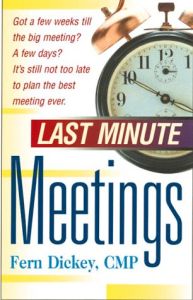Join getAbstract to access the summary!

Join getAbstract to access the summary!
Fern Dickey
Last Minute Meetings
Career Press, 2001
What's inside?
For most of us, conference time is party time. But someone works hard to put these things together.
Recommendation
Let’s get one thing out of the way: This is not a book about how to conduct last-minute meetings. It is a book about organizing conferences, conventions and other off-site gatherings that involve extensive planning - and preferably not at the last minute. That said, it’s a useful book. Fern Dickey provides exactly the kinds of hands-on details that a virgin conference organizer would need, from online resources to relevant organizations, contact information, and sample charts that you can use for record keeping, budgeting and planning. There’s nothing groundbreaking here, and there are no secret tactics revealed. Instead, Dickey has produced a thorough working reference that getabstract.com recommends to anyone new to the dizzying world of conference planning.
Summary
About the Author
Fern Dickey , CMP, is principal of the Meeting Planning Company, which specializes in providing planning and promotion services. She has planned a wide range of events - from small one-day seminars to black-tie awards banquets and special presentations to week-long educational programs.
















Comment on this summary